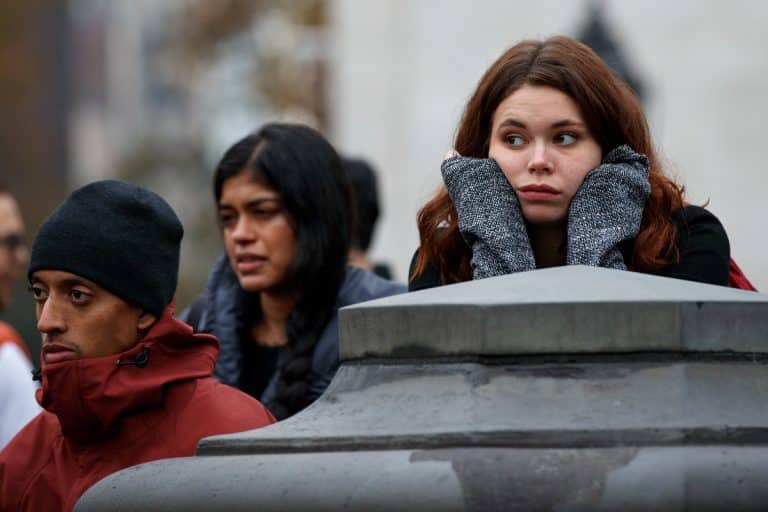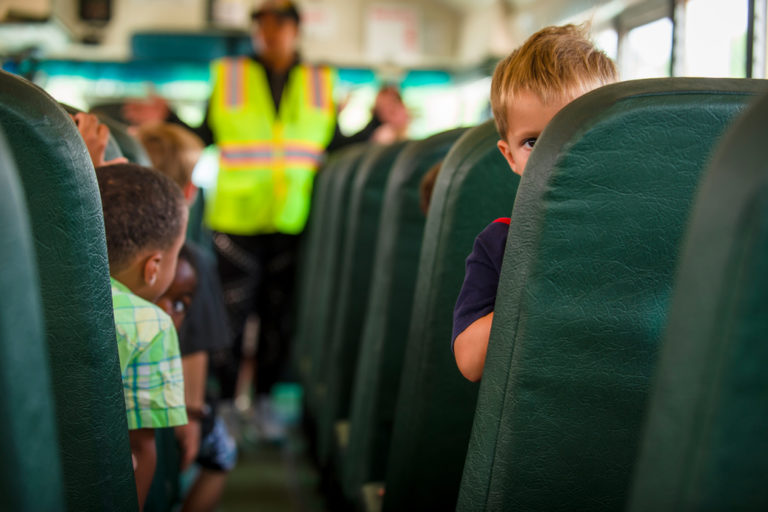
Image by Drew Angerer/Getty Images, © All Rights Reserved.
We Need a New American Story
Daniel is a friend, but more accurately, it feels like he is one of my lifelong conversation partners. We’ve sat in Washington Square Park as dusk fell over New York City, getting greasy fingers while eating cheap slices of pizza, and argued over the ethics of financial accumulation. Daniel, a community organizer and theologian, can quote James Baldwin by memory and always knows just the right thing to complicate some pat notion I’ve cooked up. He introduced me to Abraham Joshua Heschel and Wendell Berry.
Sometimes he lets me off the hook when I need it. Sometimes he puts me there, also when I need it. Lest it all seem too serious, I can assure you that we’ve spent many a night closing down a bar while dancing with a group of dear ones. On occasion, we do know when to shut up about politics.
Now, of course, is not that time. When I read Mark Lilla’s New York Times Sunday Review cover story, entitled “The End of Identity Liberalism,” I immediately craved a conversation with Daniel. In it, Lilla, a professor of history, argues that for the past few decades, liberals have relied on a “celebrate diversity” message to unify a party, and that it breeds narcissism and is, plainly put, not working — evidenced by Hillary Clinton’s recent loss. Instead, he says, we need to stop talking about all of our differences and start focusing on capturing “Americans’ imaginations about our shared destiny.”
It was immediately clear to me that there were some profound shortcomings to Lilla’s argument, but my spidey sense also said there was something valuable there, too.
I needed Daniel’s mind and heart to understand what. We live on different coasts now. He’s been sitting at the deathbed of a dear friend. I’ve been nursing a new baby. So connecting in real time feels hard. Instead I texted him: “I need to know what you think about that Mark Lilla article.”
Within a few days, he sent me a ridiculously thoughtful email that contained, among much else deconstructing what was wrong with Lilla’s argument, the following insight about what was right:
So what is the problem with the project of identity politics, the pursuit of equality? Well, as I see it there are two big limitations. The first is that it sees the condition of straight white Americans as the bar to which other groups must be brought. That is, if you happen to be a straight white person, identity politics literally has NOTHING to offer you. Worse, it is only a threat, as your ‘privilege’ must be removed for others to be equal. This is a disastrous politics for a national political party, for obvious reasons. But it also a really backward way for any Left politics to view the conditions we need to address.
What I had known was wrong with Lilla’s argument was this: what he terms “identity politics” is actually a framework for understanding the ways in which we’ve told a false and damaging story about America. Exposing the lies of that story (that everyone currently and historically has an equal opportunity at wealth, housing, education, mental and physical well-being, etc.) is uncomfortable for a reason. It’s morally reprehensible. Daunting to own and fix. It implicates people with privilege in a way that feels terrible because it is terrible. The historic and current damage is real — not just a liberal frame. That may not win votes as efficiently as pretending that voters are not only off the hook for continued inequity, but also owed something themselves. But at least it’s honest. And it’s ethical.
What Daniel helped me see is right about Lilla’s argument is this: our liberal leaders, Clinton included, have not had the moral imagination to paint a vivid picture of what everyone has to gain from that kind of honesty. If it’s uncomfortable for privileged Americans to acknowledge past and contemporary inequity (not to mention genocide, enslavement, etc.), imagine how freeing it would be to move beyond the discomfort and take responsibility for healing and repairing.
I mean real, proactive, racial responsibility, not just an attempt not to be racist interpersonally, which is as far as most people are willing to or know how to go. I don’t even really know how to go there, but somewhere right beyond the field of my own imagination there is a sense that it’s joyful and collective, a place where whiteness can be reclaimed from something characterized by silence and fragility and made righteous and radical. I’m talking about contributing to memorialization like this — the first memorial being created on lynching. I’m talking about truth and reconciliation commissions. I’m talking about restorative justice. I’m talking about reparations.
I’m talking about abandoning, as Daniel put it, “the condition of straight white Americans as the bar to which other groups must be brought.” What might we create in this country if we acknowledged that we are all vulnerable people — flesh and blood encasing bodies and minds and hearts that break, not infrequently? How might we structure work and housing if we truly embraced the fact that every single American deserves food and shelter in a destabilized economy? What would the federal government look like if it were designed to support real people, in all their complexity and beauty, not Horatio Alger, a character we’ve spent years designing for even though he is a pure, putrid fiction?
In these times, when so much seems to be retracting and recoiling in fear, we must stretch our moral imaginations further and further than we ever thought possible. We must put language to the places we see just beyond the horizon. We must argue not for a politics that shrinks from difference or covers it up, but a politics that de-centers whiteness and maleness so radically that we don’t even think about difference in the same way. To have difference, one must have a norm, a bar, a standard. The politics that will be truly unifying for the next American century will set that bar at the level of human dignity, not white historicity.
Friendship has always been my lifeboat, and in what feel like terrifying times, it feels like the most dependable vessel for getting to a better future.

